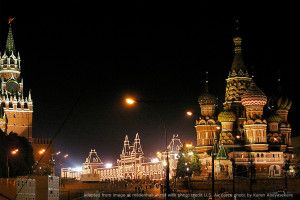Rights Groups Condemn ‘Dangerous’ Russian Undesirables Law

(RFE/RL – rferl.org – Tom Balmforth – MOSCOW, May 26, 2015)
Rights groups named as potential targets of a new law allowing the government to brand international organizations “undesirable” and shutter their Russia operations have criticized the legislation, calling it a “dangerous” new weapon in a Kremlin campaign to suppress civil society.
Activists expressed concern on May 26 that the “loosely worded” legislation could potentially be used against almost any organization, and would deepen the chill over advocacy groups within Russia by threatening to cut them off from the global network of rights groups.
The law signed by President Vladimir Putin late last week gives the authorities the power to shut down foreign and international organizations deemed a threat to Russia’s security, defense capability, or public order.
The law “is formulated in such a way that they can brand whoever they want,” said Svetlana Gannushkina, director of the Civic Assistance Group, which advocates for migrants and displaced people, and a member of the board of the widely respected Russian human rights organization Memorial.
Activists say it threatens to intensify a clampdown on civil society that began when Putin returned to the Kremlin for a third term in May 2012, after weathering big street protests he claimed were incited by the United States and other Western states.
Gannushkina compared the “undesirables” law to legislation Putin signed later that year under which dozens of NGOs with financing from abroad have been forced to register as “foreign agents” — a term that evokes the Cold War days when dissenters were sometimes stamped as “enemies of the people.”
On May 25, two days after the Kremlin said Putin had signed the bill, a little-known lawmaker from ultranationalist Vladimir Zhirinovsky’s party asked the Prosecutor-General’s Office to check whether Memorial and four other prominent groups should be listed as “undesirable.”
The other groups named by lawmaker Vitaly Zolochevsky were Amnesty International, Human Rights Watch, Transparency International, and the Carnegie Moscow Center — the Russian office of the Washington-based Carnegie Endowment for International Peace.
While most of those groups are based abroad, human rights advocates suspect the law is intended to isolate activists in Russia. Putin has frequently portrayed civil society groups, particularly those with foreign funding, as instruments used by the West to undermine his government and Russia itself.
After a number of warnings, alleged violators of the law can face criminal prosecution and punishment including financial penalties, forced labor, restrictions on movement, or up to six years in prison.
“The law is not so much about us, but primarily about Russian activists and Russian organizations,” said Tanya Lokshina, Russia program director at Human Rights Watch. “The law aims to cut them off from international networks — to put them in further isolation, in a vacuum of sorts. I think that’s what’s most important here.”
“Frankly, in order to shut down our Russia office, the government doesn’t need another piece of legislation,” Lokshina said. “That could be done in a fraction of a second.”
In comments to RFE/RL, members of four of the five groups named by Zolochevsky said his request suggested he was not acquainted with the text of the law and that he may have made the statement to raise his public profile.
Lokshina said, for instance, that Memorial is a registered Russian legal entity and therefore “cannot possibly be defined undesirable to begin with.”
But Russian authorities have cast a wide net with past laws, and Memorial Rights Center Chairman Aleksandr Cherkasov was more cautious.
“No one knows yet what it means to have been placed on this list because this law has not been implemented before,” Cherkasov wrote on Facebook.
Sergei Nikitin, head of Amnesty International’s Russia bureau, said that the “wording of the law is unclear and itself represents a danger not only to foreign and international social organizations, but also for Russian organizations.”
At the same time, he expressed doubt that the government would go so far as to brand Amnesty International “undesirable.”
Amnesty and the other groups named by Zolochevsky “in no way work on issues that undermine defense capability or the security of the country,” Nikitin said.
“Our work is primarily focused on defending the rights of people in Russia. If they want to shut our organization, they’ll have to recognize all our activities as ‘undesirable’. I think there’d be a big scandal,” he said.
“Russia would be the only country that has branded Amnesty undesirable,” Nikitin said. “It’s difficult to predict what’s going to happen, but this would really be a very strange step.”
The Prosecutor-General’s Office has not commented publicly on Zolochevsky’s request.
Russia’s rights ombudsman Ella Pamfilova has she was “seriously concerned” by the law, which has also drawn condemnation from the United States and European Union.
In a report released late on May 25, Pamfilova said the legislation was overly vague and that the power given to the government to tag groups “undesirable” without a court decision contradicted the Russian Constitution.
Under the law, authorities can ban foreign NGOs and jail Russians working with them for up to six years.
Article from Radio Free Europe/Radio Liberty – rferl.org – ©2015 RFE/RL, Inc. Article also appeared at rferl.org/content/russia-rights-groups-slam-new-undesirables-law/27037983.html
